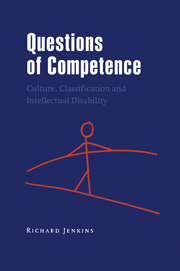Book contents
- Frontmatter
- Contents
- List of contributors
- 1 Culture, classification and (in)competence
- 2 Mental disability in the United States: an interactionist perspective
- 3 (In)competence in America in comparative perspective
- 4 Risk, resilience and competence: parents with learning difficulties and their children
- 5 Constructing other selves: (in)competences and the category of learning difficulties
- 6 Work, opportunity and culture: (in)competence in Greece and Wales
- 7 Slow cookers and madmen: competence of heart and head in rural Uganda
- 8 States and categories: indigenous models of personhood in northwest Greenland
- 9 Learning to become (in)competent: children in Belize speak out
- 10 Towards a social model of (in)competence
- Bibliography
- Index
4 - Risk, resilience and competence: parents with learning difficulties and their children
Published online by Cambridge University Press: 16 January 2010
- Frontmatter
- Contents
- List of contributors
- 1 Culture, classification and (in)competence
- 2 Mental disability in the United States: an interactionist perspective
- 3 (In)competence in America in comparative perspective
- 4 Risk, resilience and competence: parents with learning difficulties and their children
- 5 Constructing other selves: (in)competences and the category of learning difficulties
- 6 Work, opportunity and culture: (in)competence in Greece and Wales
- 7 Slow cookers and madmen: competence of heart and head in rural Uganda
- 8 States and categories: indigenous models of personhood in northwest Greenland
- 9 Learning to become (in)competent: children in Belize speak out
- 10 Towards a social model of (in)competence
- Bibliography
- Index
Summary
Research suggests that the children of parents with learning difficulties are at risk of developmental delay, maltreatment, neglect and abuse (Schilling et al. 1982). This evidence has contributed to the view that people with learning difficulties lack the competence to provide goodenough parenting. Oliver (1977), for example, asserts that they ‘continue to be incompetent rearers, whatever supportive treatment is offered’ and Fotheringham (1980) too claims that few parents have the ability to provide ‘conditions of care at the minimal acceptable level’. Accardo and Whitman (1990) argue that the only important question ‘with regard to parenting failure of significantly mentally retarded adults would seem to be not whether but when’. Such blanket judgements have been challenged by critics who point out that unrepresentative sampling, poor research design and other methodological weaknesses (especially in the outcome measures used) do not allow valid generalisations to be made about the extent or frequency of parenting failure (Tymchuk 1992; Tymchuk and Andron 1990). Five limitations in particular prevent existing research from being used to support general conclusions about the parental competence of people with learning difficulties.
First, there has been no longitudinal research on the effects of being raised by a parent or parents who have learning difficulties (Tymchuk and Feldman 1991), and no attempt has yet been made to chart their children's progress through adolescence and into adulthood (Dowdney and Skuse 1993; New York State Commission on Quality of Care for the Mentally Disabled 1993).
- Type
- Chapter
- Information
- Questions of CompetenceCulture, Classification and Intellectual Disability, pp. 76 - 101Publisher: Cambridge University PressPrint publication year: 1999
- 1
- Cited by



